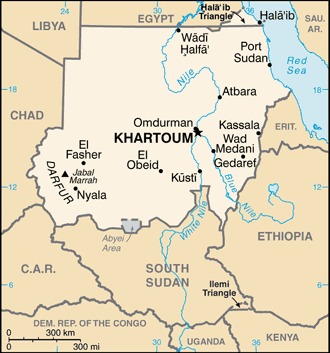Three months and counting of ongoing conflict in Sudan continues across the capital city Khartoum and the cities of Bahri and Omdurman, while fighting intensifies in Darfur and in the Kordofan State.
There is no end in sight to this ever-increasing conflict pitting the forces of army chief Abdel Fattah al-Burhan against those of his deputy of sovereign council-turned-foe Mohamed Hamdan Daglo. Daglo is commonly known as Hemedti, and he commands the paramilitary Rapid Support Forces (RSF).

The fighting broke out on April 15. Throughout the three months of conflict more than three million people have been displaced, reported the Middle East Research and Information Project. “The majority of the displacement—approximately 2.4 million people—has been internal. The rest have crossed into neighboring countries,” the project reported. Add to that, according to Mission Network News, “Sudan could be on the verge of state collapse as fighting rages in Khartoum and other parts of the country.”
According to the London based Guardian, Yale University’s Conflict Observatory—which uses satellite imagery, NASA thermal-detection data and open-source analysis—found evidence of the “targeted destruction of at least 26 communities” by RSF between April 15 and July 10. “Mass graves have been discovered, and satellite imagery shows entire urban neighborhoods and villages have been burned down,” the Guardian reported. As of July 23, estimates report between 3,000 and 10,000 have been killed with many more wounded.
During an interview with Africa Watch from his family village 63 miles outside of Khartoum, a good friend, I’m naming Luqman, for fear of reprisals, chronicled the depreciating conditions in Sudan. His family historically has been very influential in Sudanese politics. Luqman said people in Sudan were “caught by surprise.”
Having to flee Khartoum for safety reasons, Luqman shared what conditions are like for his friends and neighbors. “First, this war came as a very big surprise. Never in the history of Sudan has this happened. In fact, never in the history of the world has the capital of a country been seized by a militia, which was until very recently part of the government,” he emphasized.
“So, when the conflict began on the Saturday, April 15, we all thought this would last no longer than a day or two or three days. But as you are aware it has gone on for three months with no end in sight.”
He said, about 99 percent of the people didn’t expect the two opposing forces to break out in a full-fledged conflict. They were not prepared. “They didn’t have gas in their cars. They didn’t have enough electricity in their pre-paid meters. They ran out of cash and there was no access to banks because by the time of the third hour of fighting access to bridges or access to areas with banks became off limits. Even if you were a millionaire, you couldn’t be rich because your money was in a bank you didn’t have access to.”
This writer, while living in Sudan and running out of cash my credit cards were not accepted. I had to have money wired via Western Union.
Luqman also said government employees have not received a paycheck in three months. He added, even persons working in the private sector have not been paid. You can only imagine what people are doing to survive, he said.
And that’s if you are able to work. According to barron.com, Khartoum, before the conflict, was home to five million people. “It is now a city of shattered windows, gutted shopfronts, pockmarked cars and empty shelves, which bears witness to the rampant violence and looting,” the website noted. According to the UN humanitarian agency, prices of basic commodities, including food staples, water and gasoline, have skyrocketed, “resulting in clashes in Khartoum and other parts of Sudan.”
Sexual violence against women and girls, according to Luqman, is on the rise. Agence France-Presse (AFP) reported, “The horrors of the conflict have been compounded by a wave of sexual violence, say survivors, medics and activists. … Most have requested anonymity or, like Zeinab, used a pseudonym for fear of reprisals against them and others.”
The UNFPA, or United Nations sexual and reproductive health agency, warned that “violence is reported to be soaring in areas of Sudan where there is heavy fighting as well as along transit routes.”
Already terrified, reported UNFPA, “the threat of further (sexual) abuse hangs heavy over those fleeing as they continue their dangerous journeys to reach the (Sudanese) border crossing.”
Follow @JehronMuhammad on Twitter













